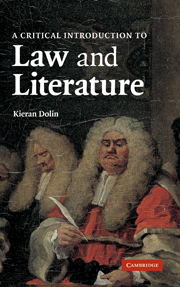Book contents
- Frontmatter
- Contents
- Preface
- Introduction to law and literature: walking the boundary with Robert Frost and the Supreme Court
- PART I EMINENT DOMAINS: THE TEXT OF THE LAW AND THE LAW OF THE TEXT
- 1 Law's language
- 2 Literature under the law
- PART II LAW AND LITERATURE IN HISTORY
- Conclusion
- Notes
- Bibliography
- Index
2 - Literature under the law
Published online by Cambridge University Press: 05 June 2012
- Frontmatter
- Contents
- Preface
- Introduction to law and literature: walking the boundary with Robert Frost and the Supreme Court
- PART I EMINENT DOMAINS: THE TEXT OF THE LAW AND THE LAW OF THE TEXT
- 1 Law's language
- 2 Literature under the law
- PART II LAW AND LITERATURE IN HISTORY
- Conclusion
- Notes
- Bibliography
- Index
Summary
In June 1971 after unsuccessfully defending the editors of the underground magazine Oz on charges of obscenity, the writer and barrister John Mortimer declared from the steps of London's Old Bailey that, ‘There cannot be a limit on the writer.’ The notion that literature is a zone of free expression, that ‘there cannot be a limit on the writer’, is an idealist one. As we shall see in this chapter, it represents a long-held ideal in Western literary culture, and one that has been vigorously opposed. Not only the force of law, but inherited systems of ideas concerning both social values and literary forms, and the economics of publishing have all worked, admittedly in varying degrees, as ‘limits’ on writers. Consequently, it is important not to regard literature and law as ‘polar opposites’, one a space of freedom and the other an institution of social control. Rather, this chapter will look more closely at the laws that regulate and control literature as a vital perspective in understanding the relationship between these two discourses.
More recently, Antony Julius has written generally of these laws that ‘bear on literary creativity’:
There is no discrete body of law relating to literature. There are instead a miscellany of laws regulating literature, some statutory, some judge-made, some criminal, others civil. The law of defamation, copyright law, laws prohibiting obscenity and blasphemy, bear – in variously restrictive and overlapping ways – on literary creativity. But there is no legal code which takes literature as its subject; the ‘law of literature’ lacks coherence, and is without system or structure. It is in a state of disarray; it oppresses without bringing order.
- Type
- Chapter
- Information
- A Critical Introduction to Law and Literature , pp. 41 - 72Publisher: Cambridge University PressPrint publication year: 2007

